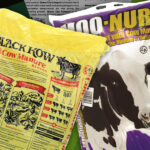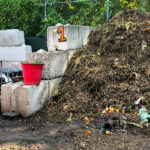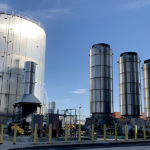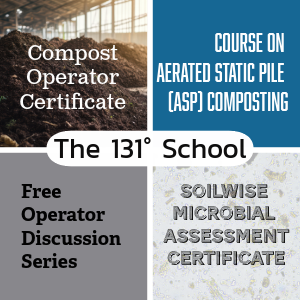Top: Finished yard trimmings compost being loaded into a trailer at Mesa County Compost Facility. The USDA grant is helping to fund a program focused on compost marketing, education, and distribution to create more space at the facility to incorporate food waste.
Nora Goldstein
The City of Grand Junction (pop.~68,000) is in Colorado’s Western Slope Region. In 2023, the city received a grant from the U.S. Department of Agriculture (USDA) Natural Resources Conservation Services for $89,600 with an additional $36,906 of in-kind funds committed to the grant goals by the City and Mesa County. “The grant funds, totaling $126,506, are being used to expand the city’s food waste collection and diversion efforts, conduct on-farm compost trials to demonstrate how compost can be applied to various crops to enhance the soil’s water-holding capacity and organic matter content, and run an education campaign regarding finished compost use and benefits,” explains Kym Beck, City of Grand Junction Recycling/Waste Reduction Supervisor. “The grant runs on a two-year cycle, so its requirements will be met at the end of 2024. The education and school composting programs began earlier this year.”
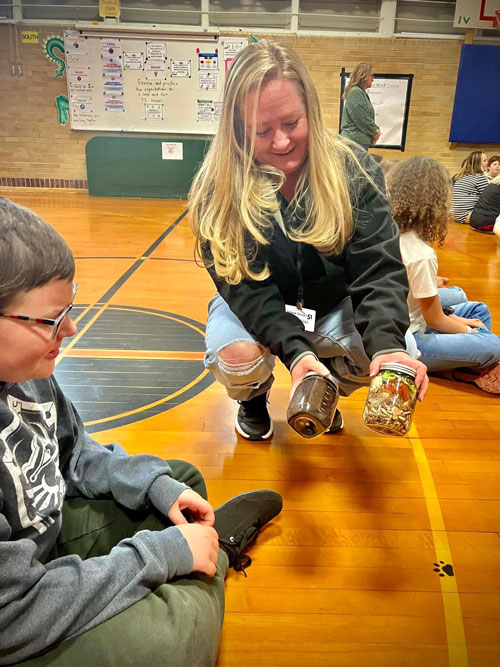
Programs with Mesa County School District 51 at two elementary schools educate students about how to reduce cafeteria food scraps.
A 2020 comprehensive plan as well as the Strategic Plan outlined by City Council in 2023 identified recycling, reuse, and waste reduction as strongly held goals. According to the Western Colorado Waste Diversion Study, conducted by Souder Miller and Associates in 2018, about 13% of Mesa County’s waste is comprised of food. This is equivalent to 23,612 tons of organic material that goes into the landfill annually because food waste is not currently accepted at the local Mesa County Compost Facility. As compost is more effectively used by the community for gardens and agriculture, additional space will be made available to accept food waste for composting.
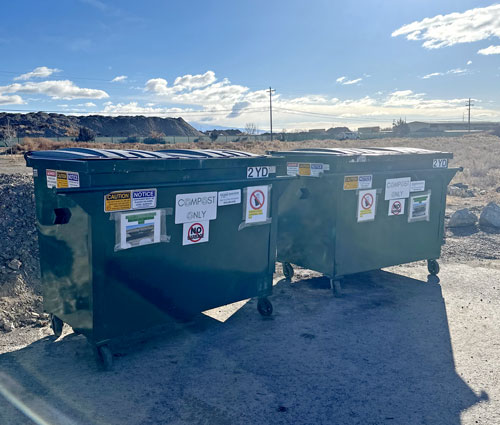
Food waste collection began in late October 2022, servicing 12 accounts including two community food banks (container at one food bank shown above). Photos courtesy of City of Grand Junction
Food waste collection began in late October 2022, servicing 12 accounts including restaurants in the city’s downtown, two community food banks and a public drop off site at the recycling center, which is open to the public six days a week. “Close to 70 tons of food waste have been collected since implementation,” adds Beck. “We’ve been taking it to the Mesa County Landfill, putting it in roll-off containers, then transferring it to a private composting facility in Delta County (CO), which is about 45 miles away. Our department is also working closely with Mesa County School District 51 at two elementary schools to reduce the amount of waste from their cafeteria. The food waste collection is still in the ‘pilot’ phase while our department continues to gather data and analyze the logistics of implementing a full-scale collection route.”
Local Composting Capacity
The Mesa County Solid Waste Management Division runs a composting facility on 11 acres north of the county landfill. The facility accepts approximately 60,000 cubic yards/year of yard trimmings from residents and businesses. The yard trimmings are composted for approximately 16 weeks; the compost cures for another year before it is screened, sampled (to ensure it is pathogen and weed-free), and sold to the community as a soil amendment known as Mesa Magic Compost. The Mesa County Solid Waste Management Division is an enterprise fund, operating as a business subset of Mesa County; it does not use tax dollars to operate. Tipping fees and revenue from compost sales pay for the operation of the facility.
“Because it is not ideal to haul food waste collected in Grand Junction to a Delta County facility, the city and the county started talking about how to expand services at the Mesa County Facility to accept food waste,” says Jennifer Richardson, Mesa County’s Solid Waste and Sustainability Division Director. A number of issues had to be addressed before the existing facility could accept source separated food waste:
- Modify the permit to accept food waste: In 2023, Mesa County modified its compost permit to include food waste as a feedstock and submitted it to the Colorado Department of Public Health and the Environment (CDPHE) for approval. The permit modification is pending approval, and the CDPHE anticipates approval of the request.
- Add more composting area to the existing facility. The current composting operation uses all 11 acres to process yard trimmings. The site will need to expand to accept additional feedstocks like food waste. Along with the permit modification, an expansion design has been developed and submitted to the CDPHE for approval.
- Resolve facility financing: The composting facility is currently operating at a loss and is subsidized by the landfill to remain operational. “Expanding compost services to include food waste will cost a significant amount of money for infrastructure and operating expenses,” explains Richardson. “Additionally, there is a surplus of finished compost, and more feedstock means more compost needs to be sold.”
Once CDPHE approves Mesa County’s composting permit modification request, the county must build an engineered working pad, storm water management pond, and waste collection bays, and install additional groundwater monitoring wells, she adds. In 2024, the City of Grand Junction and Mesa County partnered to hire a consultant to conduct a business case evaluation for the potential expansion of the County’s composting operation. Carollo Engineers was contracted to assess the feasibility of expanding services.
Its scope of work will estimate how much compostable waste is in the community; whether the existing composting facility and the expansion can handle all of that estimated tonnage and the cost to manage it; the environmental benefits of composting the organics; and other alternatives to landfill disposal should Mesa County not be able to compost all the compostable waste. “Because taxpayer dollars do not fund the Solid Waste Management Division, Mesa County can only expand the composing facility if we can attain the money needed for expansion infrastructure and facility operation,” emphasizes Richardson.
Another aspect of the program focuses on marketing, education, and distribution of finished compost to create more space for incorporating food waste into local operations. Through partnerships with Mesa County and Colorado State University’s (CSU) Western Colorado Research Center, and with the assistance of the USDA grant, a compost utilization program will be implemented to promote compost use and demonstrate the benefits for water conservation and soil health.
Benefits of compost utilization and recommendations for application rates will be highlighted through the program’s partnership with CSU’s Orchard Mesa Research Station that began in 2023, the first year of the grant. On-farm trials will demonstrate how compost can be applied to various crops including peach tree, vegetables, and ornamental plants. Data collected, such as water holding capacity and organic matter content, will help agricultural producers connect with state and local incentives to utilize compost in their practices to enhance soil health. Compost will also be donated to other community outreach and demonstration sites, such as community gardens and schools.



